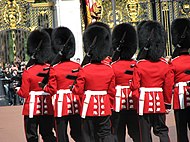Politics

As part of the United Kingdom, the basic political system in England is a constitutional monarchy and parliamentary democracy. There has not been a Government of England since 1707, when the Acts of Union 1707, putting into effect the terms of the Treaty of Union, joined England and Scotland to form the Kingdom of Great Britain. Before the union England was ruled by its monarch and the Parliament of England. Today England is governed directly by the Parliament of the United Kingdom, although other countries of the United Kingdom have devolved governments. In the House of Commons which is the lower house of the British Parliament based at the Palace of Westminster, there are 529 Members of Parliament for constituencies in England, out of the 646 total. In the United Kingdom general election, 2005 the Labour Party had the most MPs elected in England with 284, while the Conservative Party had 194 MPs elected although they received a larger percentage of the popular vote than any other party with 35.7%. The third largest party are the Liberal Democrats who had 47 MPs elected. Respect and Health Concern each have one MP, and there is an Independent Labour member originally elected for Labour. The two largest parties are led by Gordon Brown for Labour and David Cameron for the Conservatives.

As the United Kingdom is a member of the European Union, there are elections held regionally in England to decide who is sent as Members of the European Parliament. The 2009 European Parliament election saw the regions of England elect the following MEPs: twenty-three Conservatives, ten Labour, nine United Kingdom Independence Party (UKIP), nine Liberal Democrats, two Greens and two British National Party (BNP). Since devolution, in which other countries of the United Kingdom—Scotland, Wales and Northern Ireland—each have their own devolved parliament or assemblies for local issues, there has been debate about how to counterbalance this in England. Originally it was planned that various regions of England would be devolved, but this was rejected in a referendum. One major issue is the West Lothian question, in which MPs from Scotland and Wales are able to vote on legislation affecting only England, while English MPs have no equivalent right to legislate on devolved matters. This when placed in the context of England being the only country of the United Kingdom not to have free cancer treatment, prescriptions, residential care for the elderly and free top-up university fees, has led to a steady rise in English nationalism. Some have suggested the creation of a devolved English parliament, while others have proposed simply limiting voting on legislation which only effects England to English MPs.
Law

The English law legal system, developed over the centuries, is the foundation of many legal systems throughout the Anglosphere.[79] Despite now being part of the United Kingdom, the legal system of the Courts of England and Wales continued as a separate legal system to the one used in Scotland as part of the Treaty of Union. The general essence of English law is that it is made by judges sitting in courts, applying their common sense and knowledge of legal precedent—stare decisis—to the facts before them.[80] The court system is headed by the Supreme Court of Judicature, consisting of the Court of Appeal, the High Court of Justice for civil cases and the Crown Court for criminal cases.[81] The Supreme Court of the United Kingdom is the highest court for criminal and civil cases in England and Wales, it was created in 2009 after constitutional changes, taking over the judicial functions of the House of Lords. A decision of the highest appeal court in England and Wales, the Supreme Court, is binding on every other court in the hierarchy, which follow its directions. Crime increased between 1981–1995, though since then there has been 42% fall in crime for the period 1995–2006. The prison population doubled over the same period, giving it the highest incarceration rate in Western Europe at 147 per 100,000. Her Majesty's Prison Service reporting to the Ministry of Justice, manages most prisons, housing over 80,000 convicts.
Regions, counties and districts

The subdivisions of England consist of as many as four levels of subnational division controlled through a variety of types of administrative entites. They have been created for the purposes of local government in England. The highest tier of local government are the nine regions of England—North East, North West, Yorkshire and the Humber, East Midlands, West Midlands, East, South East, South West and Greater London. These were created in 1994 as Government Offices, used by the British Government to deliver a wide range of policies and programmes regionally. They are used for electing Members of the European Parliament on a regional basis. After devolution began to take place in other parts of the United Kingdom it was planned that referendums for the regions of England would take place for their own regional assemblies as a counterweight. London accepted in 1998—the London Assembly was created two years later. However, the proposal was rejected by the northern England devolution referendums, 2004 in the North East, further referendums were cancelled. There are plans to abolish the remaining regional assemblies in 2010 and transfer their functions to respective Regional Development Agencies and new system of Local Authority Leaders’ Boards.
Below the regional level all of England is divided into one of 48 ceremonial counties. These counties are used primarily as a geographical frame of reference and have developed gradually since the Middle Ages, with some established as recently as 1974. Each has a Lord Lieutenant and High Sheriff; these posts are used to represent the British monarch locally.Outside Greater London and the Isles of Scilly, England is also divided into 83 metropolitan and non-metropolitan counties; these correspond to areas used for the purposes of local government and may consist of a single district or be divided into several. There are six metropolitan counties which are based on the most heavily urbanised areas and do not have county councils. In these areas the principle authorities are the councils of the subdivisions, the metropolitan boroughs. 27 non-metropolitan "shire" counties have a county council and are divided into districts, each with a district council. They are typically, though not always, found in more rural areas. The remaining non-metropolitan counties are of a single district and usually correspond to large towns or counties with low populations; they are known as unitary authorities. Greater London has a different system for local governance, with thirty-two London boroughs and the City of London covering a small area at the core, which is governed by the City of London Corporation. At the most localised level, much of England is divided into civil parishes with councils; they do not exist in Greater London.

No comments:
Post a Comment